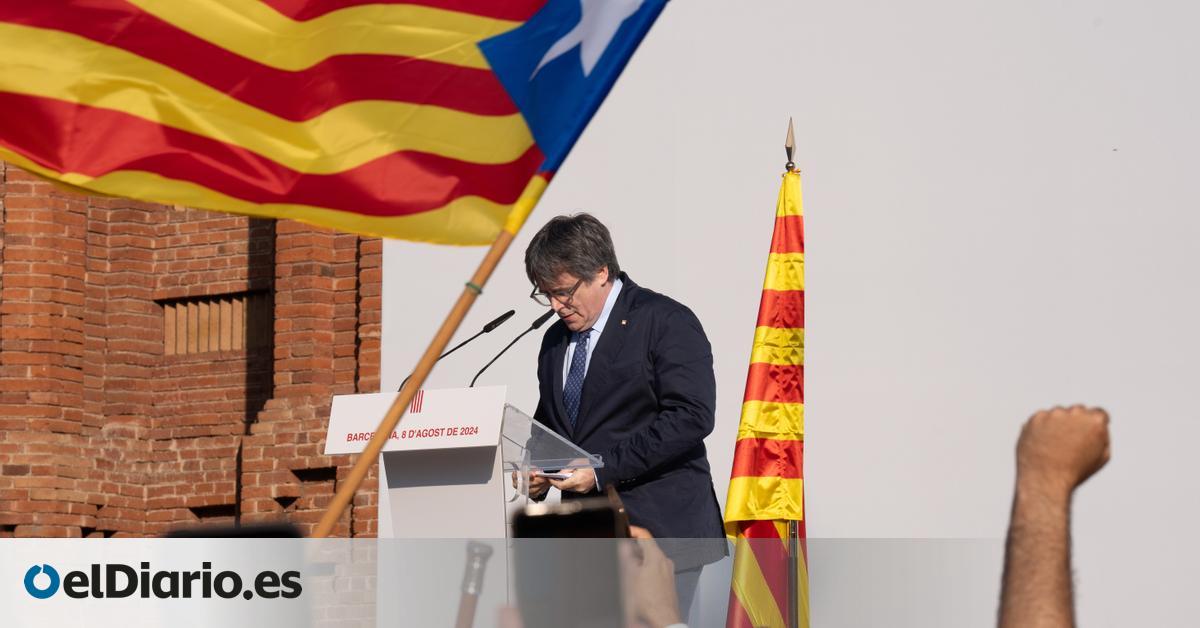
Carles Puigdemont’s brief visit to Barcelona before disappearing again and, as he announced at the last minute on Friday, returning to Waterloo (Belgium), did not succeed in stopping Salvador Illa’s investiture but it did open a new judicial front in a process whose political burial had just been officially held. From the Supreme Court, Judge Pablo Llarena has asked the Mossos and the Ministry of the Interior for explanations on what went wrong so that the former president disappeared in front of hundreds of people, and three agents of the autonomous police are being investigated. It is not clear that this failure of the police operation will translate into judicial problems for the former president of the Generalitat but several articles of the Penal Code do punish those who help a fugitive to evade justice.
Unlike when he left Spain in 2017, this time Puigdemont was under a real threat: he is wanted by order of Judge Llarena. Last July, the magistrate declared that the crime of embezzlement attributed to the pro-independence leaders – the leader of Junts among them – is not amnestiable. Consequently, he kept in force a judicial resolution that obliged the security forces to arrest him as soon as they had evidence that he had set foot on national territory.
However, Puigdemont managed to get into the centre of Barcelona, take a short walk, make a speech to thousands of people and then escape without a trace. According to his team, he had been in the Catalan capital for several days. The operation of more than 300 agents deployed throughout Catalonia to try to find him after his reappearance was of no use. His lawyer, Gonzalo Boye, said on Friday that the leader is already out of Spain. And the reality is that the only people arrested on Thursday ended up being two Mossos d’Esquadra accused of helping the former president escape, to whom a third was added late on Friday.
At the last minute, Puigdemont posted a message on X stating that after his escape from Barcelona he had returned to Waterloo (Belgium). “Today I am in Waterloo after some extremely difficult days. We must analyse the political situation and put into perspective the underlying reason for the operation that made what happened yesterday possible. And I will do so. But it is thousands of kilometres in a few days and many days of tension that is difficult to explain, and I trust that it is understood that they still need a few hours to recover and take a breath,” the former president wrote.
Puigdemont attacked “the ineffable Department of the Interior” for having imposed, in his opinion, a “wave of repression unleashed by the minister Elena and the chief commissioner of the Mossos” that “is worthy of Marlaska or Zoido”. Puigdemont claims that due to the operation to arrest him, the Mossos have taken “the path towards their Spanishness”, disqualifying the press conference offered by the Minister of the Interior and the top brass of the Mossos, this Friday.
As for the arrested Mossos, one of them is the owner of the vehicle in which Puigdemont is suspected of having escaped. He was released hours later. The court, in a decision against the Public Prosecutor’s Office, rejected the ‘habeas corpus’ that he had requested, a legal figure that allows a detainee to be immediately brought before a court so that his allegations can be heard and a decision can be made as to whether the arrest is legal or illegal. If a judicial case is finally opened, he will be summoned as an investigated person.
At a press conference held this Friday in Barcelona, the chief commissioner of the regional police, Eduard Sallent, left the door open to more arrests. “Any agent who is proven to have participated in the escape or arrival of Puigdemont will be arrested and brought to court,” he said, hours before the third arrest was announced. In addition, the Mossos admitted that they failed to foresee that the leader of Junts would try to enter the Parliament where the investiture debate was held Salvador Illa and charged against the authorities who accompanied him and against the agents who collaborated in his escape.
Judge Llarena’s questions
Judge Llarena, supposedly on vacation, followed closely the development of the failed operation and made his move 24 hours later. Early on Friday he issued two letters directly addressing the Mossos d’Esquadra and the Ministry of the Interior to ask why the operations to arrest Puigdemont, who he has been seeking since 2017, had “failed.”
The magistrate’s questions do not reveal whether he intends to open any kind of criminal investigation, but they do show his intention to identify any possible perpetrators. He wants to know whether the error was committed on the street, either on Passeig Lluís Companys or at a border post. He also wants to know whether it was a consequence of the planning of the operation. Once he has the answer, legal sources explain, he will decide whether it is worth opening a criminal investigation outside of the investigations already underway into the two arrested Mossos.
On Friday, the Minister for the Presidency, Justice and Relations with Parliament, Félix Bolaños, exclusively blamed the Catalan government for Puigdemont’s escape. “The entire operation that guaranteed that the investiture could take place normally and that should guarantee that the Supreme Court’s order was complied with was carried out by the Mossos, they are the competent police force because they are and act as judicial police,” he said.
The case has not yet been brought to court, but Spanish criminal law does have elements to punish those who help a fugitive to evade justice. For example, article 451.3 of the Penal Code provides, in some cases, sentences of between six months and three years in prison for those who help the alleged perpetrator of a crime to “evade investigation by the authorities or their agents or to escape being sought or captured.” To do so, however, it would have to be proven that the Mossos acted “with abuse of public functions,” which is the requirement demanded by the Penal Code. That is, that they took advantage of their status as police officers to help the former president escape.
On the other hand, the Criminal Code also provides for fines and disqualification for authorities or public officials who “openly” refuse to comply with court rulings. In a ruling last June, the judge expressly ordered that the Security Forces and Corps be informed that the “national arrest warrants” against Puigdemont and other suspects remained “in force and active” and that they should “proceed to comply with them as long as these decisions are not judicially modified or revoked.”
Likewise, any public official who “intentionally” fails to promote the prosecution of crimes of which he is aware or of those responsible may also be subject to disqualification. In this case, the misappropriation of public funds to launch the process attributed to Puigdemont.
The case, still pending judicial development, comes with the procés theoretically buried from a judicial and political point of view. The start of Salvador Illa’s legislature with Junts as the second political force and without the total control of the Parliament that the independence movement once held coincides with the entry into force of the amnesty law and the filing of a good part of the criminal cases surrounding the 2017 procés.
Source: www.eldiario.es

